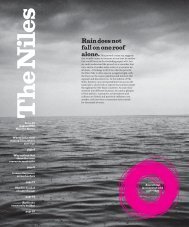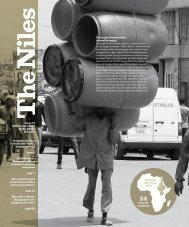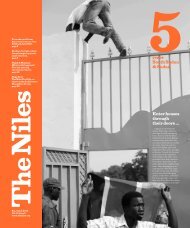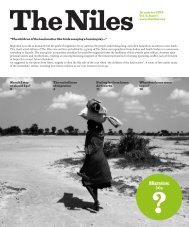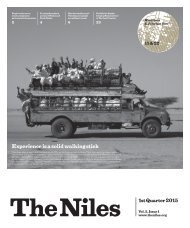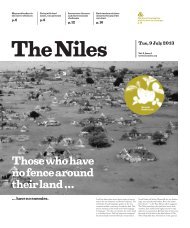We are what we eat
The food we eat literally determines who we are. It influences our physical, mental and even emotional well-being. From Egypt’s Cairo to Burundi’s Gitega, this issue of The Niles attempts to explore the essentials of food: from conflict and food insecurity to the sensory aspects of preparing and eating national dishes.
The food we eat literally determines who we are. It influences our physical, mental and even emotional well-being. From Egypt’s Cairo to Burundi’s Gitega, this issue of The Niles attempts to explore the essentials of food: from conflict and food insecurity to the sensory aspects of preparing and eating national dishes.
Create successful ePaper yourself
Turn your PDF publications into a flip-book with our unique Google optimized e-Paper software.
A woman dividing the maize she
received as monthly food ration
in the Mahad IDP centre in Juba,
South Sudan.
Photo: Bullen Chol
“We inherited
the small plots
of land from
our father.
Our sons and
daughters
will not have
that privilege.
It is a pity.”
A March United Nations Mission in South Sudan (UNMISS) update said
about 181,891 people were seeking shelter at civilian protection sites across
the country.
The report added that the UN agencies, and other humanitarian partners,
are collaborating to support the needy with over 15,000 metric tonnes of food
and nutrition assistance.
Tens of thousands of citizens living in Juba’s temporary camps rely on
this life-saving aid. Despite this massive humanitarian effort, food is often
not enough.
The Mahad site hosts a population of 3,423, about 1,200 households,
mostly, women and children and elderly depending on monthly humanitarian
aid.
Twenty-six-year-old Sarah Juan lives here, and she is a mother of six
children. She said the monthly ratio had been cut compared to 2014, at the
height of the crisis.
“I only received 10.5 kilograms of maize, 1.5 kilograms of beans and 0.63
litres of cooking oil, for a month, which cannot feed us for this number of days.
Sometimes it does not even come on time. My children and I cannot survive
without food,” Juan said.
Mach Nhial, one of the camp leaders, said the drastic decline in food ratios
is worrying and alarming amid an economic crisis that spurs high prices of
food commodities.
“Last year, the matrix for the food distribution was 15 kilograms per individual,
but this year, it has decreased. So, this is the situation we are undergoing.
The food is not enough,” Nhial said.
But there is hope. In parts of the country that have been relatively secure,
the availability of seasonal harvests from September has slightly improved the
overall outlook. Between September and December 2019, 4.54 million people
– 39 percent of the population in South Sudan – are projected to be severely
food insecure.
Revise tradition of inheritance to save the land
In both Burundi and Ethiopia, the cultural practice of splitting up land amongst
heirs, destroys the land, yields bad harvests and leaves people hungry.
Addis Getachew & Fabien Niyonizigiye
Addis Ababa, Ethiopia & Bujumbura, Burundi
Kabura Serges was born and raised in Kayanza, Burundi, and
he is currently facing the challenge of dividing his half-hectare
plot of land amongst his eight adult children. He claims that
disputes among his children have caused serious feuds within
his family, as his children suffer from insufficient harvests from
the fragmented farmland they have inherited.
One child and his family might farm beans on his small portion of land,
and another might cultivate sorghum. Regardless of what they plant, the
meagre harvests bring chaos and unstable livelihoods to all families. These
are common issues in most families living in Kayanza province and generally
throughout the country.
Land fragmentation in Burundi consists of the process of taking inherited
land from parents or grandparents and dividing it into several sections among
brothers and sisters of a family.
Burundians regard land as one of the greatest treasures a family can possess,
and land has historically been a sign of wealth and prestige in Burundian culture.
Burundi is a small landlocked and densely populated country, with 250-260
inhabitants per square kilometre. Over 90 percent of Burundians depend on
agriculture to sustain their livelihoods.
The impact of land fragmentation
Dividing land amongst heirs comes with several negative impacts, notably
the small harvests on tiny plots of land, contrasted with large Burundian
families, which have an average of six births per woman.
Niyitunga Marcien, the director of the provincial agriculture and livestock
department, says: “Every year there are considerable declines in our
agricultural harvests due to land fragmentation, which is frequent and common
in our up-country provinces because they usually contain large families with
high birthrates.”
He added that due to the lack of land space, farmers tend to exploit the land.
This leads to poor quality and less fertile soil, exacerbating the poor harvests.
Marcien blames the inheritance processes that perpetuate land fragmentation.
What is the solution?
While the government says it is coming up with strategies to fight poverty,
scarce farmland and productive land management, Evariste Ngayimpenda,
a demographic expert says that as long as there are no political strategies
organising public and private property nothing will stop the current land
disputes occurring in most Burundian families.
An intercontinental issue
Thousands of miles to the northeast of Burundi sits the much bigger
Horn of Africa nation, Ethiopia, with more than 100 million inhabitants.
As in Burundi, most people rely on agriculture for their livelihood.
Begashaw Gemechu sits in the shade created by an acacia tree in the
middle of a small patch of farmland in Melka Adama, close to the sprawling
city of Adama.
“Forty years ago this land was less inhabited, and there was plenty of land
to farm,” he said pointing to fields in the distance – lands he apportioned among
his eight children, all of whom are now married.
As his family swells with grandchildren, the patches of land will grow
impossible to divide. Seventy-five percent of Ethiopia’s population is aged
between of 18 and 35.
“And some of them sold parts of their land to buy a Bajaj (a tri-wheeled
motor car used as a taxi in the city), and they are struggling to make ends
meet,” Gemechu said.
One of Begashaw’s sons, Addisu, said: “We inherited the small plots of land
from our father. Our sons and daughters will not have that privilege. It is a pity.”
According to Addisu, urban ways of life will be the future of the whole
village and “[…] our children need to adapt to that and get a level of education
to take them somewhere.”
In Ethiopia, with land fragmentation creating the same problems as
in Burundi, young people have begun to migrate to urban centres in search
of jobs, as they have not inherited land of their own.
10
Fragmented farmland in Burundi.
Photo: Fabien Niyonizigiye
TN14_20191203_II.indd 10 2019/12/03 10:08









